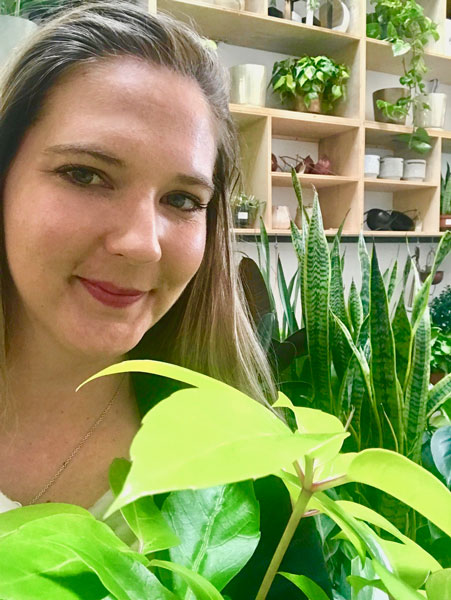6/1/2019
Eyes on the Prize
Jennifer Polanz

Retailers today are a little bit like that circus act with all the plates spinning on thin stakes. There are a multitude of tasks that need to be completed for the success of the business—not just in the day-to-day, but also looking toward the future to ensure the business stays healthy in the long-term.
In fact, it can get so precarious that some retailers might feel less like the spinning plates guy or gal, and more like the juggler with the sharp blades or chainsaws. That’s why we took this question to this year’s crop of Green Profit/RBI Young Retailer Award nominees. We wanted to see if they had some creative solutions to keeping all these plates/blades/chainsaws in the air. Turns out we weren’t disappointed. Read on to see how they face these challenges.
Meet the 2019 Judges:
Bill Calkins—Retail Garden Center Expert
Amanda Bruce—General Manager, Cedar Rim Nursery and 2018 Young Retailer Award winner
Bill McCurry—Green Profit columnist and owner of McCurry Associates consulting firm
Kate Terrell—Store Manager of Wallace’s Garden Center (and a former YRA nominee!)
YRA ESSAY QUESTION:
How do you plan ahead for the long-term to keep your garden center business advancing/moving forward, while also handling your day-to-day tasks?

MORGAN HUSTON
AGE: 30
TITLE: Store Manager
OPERATION: Birdsall & Co., Englewood, Colorado
The weeks leading up to the opening of our second location were completely overtaken by minutiae; absorbed by the details of logistics and merchandising, I hadn’t taken a moment to sit back and appreciate how incredible it was that we were doing this.
The night before we officially opened, a few of us were putting finishing touches on the displays, putting out the last plants and breaking down boxes, when a woman wandered in. Upon hearing that we were opening the next day, she asked us if we had made a sale yet. She told me that according to Jewish and Arab custom, it’s bad luck if your first customer (of the day, of the life of the business) leaves without making a purchase. And as she walked out with a candle and a plant, I actually teared up.
Sappy, I know. It’d taken a very human connection, however simple, to restore my perspective about what we were actually doing here. Yes, we’re all in this business to make money, but I suspect that few among us who work in the retail space are content to leave it at that. It’s so easy to get lost in the day-to-day needs of a retail business because there’s no lack of things that need to get done; yet, ultimately, we’re in the business of building community. Local retail stores are facing the existential threat of online shopping, free shipping, click-of-a-button-on-the-couch convenience. Yet without our shops, we would lose an important piece of the neighborhood identity, of the larger sense of community, and of simple connection with each other.
No matter what, to be a part of the community, the store has to have financial success. To thrive as a small business in an ever-competitive market, there’s little room for error or oversight. We have procedures in place to keep us all on the same page and avoid the disaster of having one person holding all the knowledge in her own head. Nothing fancy, but a couple of white boards, red duct tape, a weekly staff meeting and our “If I Die Book” help us all stay organized during the season while we juggle shipments, special orders, product holds, inventory management and a store full of customers. We’re a tiny team, and while everyone has their clearly defined roles, we’re all expected to step up if anything needs to be done.
I was taught early on by my entrepreneurial mother that there’s a fine line to tread when running a business: you have to acknowledge your strengths and weaknesses, and delegate to other team members accordingly, but never, ever let anything slip through the cracks. Oh, and try doing that without micro managing. I live in a world of lists and we’re so lucky to have a tight-knit team that takes our business as seriously and as personally as we do.
There’s so much to be said for knowing that yours aren’t the only set of eyes on the prize. Almost constant communication (texts, emails, notes, shouting across the store) and transparency about our goals and challenges in real time are instrumental in creating a team that’s all rowing in the same direction. I see the day-to-day tasks of our store as the building blocks for our future success, and whether I’m devoting my day to unpacking and tagging a shipment of plants or to scouting out new markets for future stores, it’s all valuable. No long-term plan for the future will ever be valid if the people putting the plan together are stuck in the office looking at spreadsheets with no feel for the customer base or the products.
 As a biophilic store dedicated to bringing people closer to nature and daily enjoyment of the outdoors, our present and future success relies in large part on our ability to inspire and educate our customers. We have to know more than anyone should about whether that fountain might be too loud for the space, why your plant isn’t thriving, whether you should get the blue-glazed pots or the cast-stone urns for the front steps. Having a salesperson take the time to sit down and look at the pictures on your phone of this weird corner of the garden you want to fix is what sets our small business model apart (and arguably, above) the anonymous online experience. There’s no planning for the future of our business without ensuring that kind of personalized service, which in turn means that our team has to be phenomenal and our products irresistible.
As a biophilic store dedicated to bringing people closer to nature and daily enjoyment of the outdoors, our present and future success relies in large part on our ability to inspire and educate our customers. We have to know more than anyone should about whether that fountain might be too loud for the space, why your plant isn’t thriving, whether you should get the blue-glazed pots or the cast-stone urns for the front steps. Having a salesperson take the time to sit down and look at the pictures on your phone of this weird corner of the garden you want to fix is what sets our small business model apart (and arguably, above) the anonymous online experience. There’s no planning for the future of our business without ensuring that kind of personalized service, which in turn means that our team has to be phenomenal and our products irresistible.
So much about looking forward in our business is to avoid complacency and repetition. Our job is to recognize and anticipate trends, and then apply them to the Colorado lifestyle and aesthetic. There’s always an element of trial and error involved, but we talk to our customers to glean what it is that they’re looking for. We bring that back to our major vendors, who are just as eager to see what’s coming around the bend as we are, and are able to get some things on our wish list either imported or manufactured.
We were able to do that recently with steel fountains dipped in zinc that we imported from Hungary in response to our customers wanting lightweight, modern fountains with huge impact. We do that yearly with custom pots imported on direct containers from Asia. Engaging in these conversations with our customers and vendors takes care not only of the immediate need for innovative products in the stores, but also keeps us ahead of the trend curve, priming us to be there when tastes and needs inevitably evolve.
Small, local businesses are a crucial part of our communities and these can only thrive if the daily checklists and the long-term planning go hand in hand and inform each other. In small business, nothing should be left to chance!

TANNER JONES
AGE: 24
TITLE: Garden Center Manager
OPERATION: Helmi’s Gardens, Columbia, Missouri
We often say how our industry is made of isolated silos, meaning the business people will always be good at business and finance, growers at growing plants, marketers at marketing the product to the consumer, as well as every other skilled component that completes the retail industry. However, finding someone with their head in the sky, to think big and about the next 30 years of advancement, while being able to sweep floors, answer phones, load trees, herd cats, speak plant lingo to customers and still maintain a full head of hair … well, you’re asking a lot of one person—or 10.
Point blank—it’s no easy task to keep things moving forward and not get bogged down in the day-to-day. Some days, it involves 16 hours of scrubbing flats and pinching petunias, while paying a bill over the phone and trying to help a customer, but in those moments come ideas. Suddenly I can think of a way to make this process more efficient. Or maybe if we could buy that property that backs up to us we could grow more of our own product that finished material seems to always be sold out of. Or how can I get that strange plant I saw on Instagram into production? Carrying around a small notebook to clear a swollen head of thoughts can come in handy when a confused customer thinks you’re having a conversation with a monstera ... no, I’m actually just talking to myself …
Bottom line—our brains can swell with big ideas. Sometimes all it takes is a quiet, empty greenhouse at 10:00 p.m. once in a while to really breathe in and think about the path your store is evolving down. I was once told that one had to be crazy to work in retail. Working with the public makes one even more crazy, but someone who can see that vision, and the big picture while setting aside the nitty-gritty—which is probably the most daunting and daring tasks—takes an extra special concoction of grit and nuttiness. Many of your customers have no clue about the nights spent online finding new plants, researching interior design trends, trialing plants in your own home, and trying to exceed their expectations each and every time.
Always remember—the people who walk in your door everyday come first. They come before errands, they come before office work … heck, they get their service before we eat most times. I can’t tell you the last time I had a full lunch break. By placing the people who want to shop at your store first, your team is living in the present. Grounded. Real. You can’t dream big if the people at your doorstep don’t have the attention and service they need.
Customers come into your store for a reason. They’re there (hopefully) to have an experience in your store and support your business. They take precedence over every other task. If that means staying late to down stock before the weekend, pouring them a glass of wine while they shop or throwing in something extra special with their purchase, then so be it. Remembering who your customers are, what plants they have (or have killed inadvertently), their name, their interests and your company has someone who will come back time after time.
I learned a long time ago living in a small town that people talk. They talk in Pilates, coffee shops, at lunch dates, philanthropic events and words tend to spread like wildfire—good or bad. Best case, your clients will tell his or her circle of friends about that wonderful place on the corner of Scott and K— the one with the three cats, assorted strange poultry and the best employees of any establishment in town. And every time they go shop at Helmi’s, he or she always finds something new and service is always top notch. That, folks, is the goal of building your future customer base. Good words bring new faces; new faces and new generations bring new revenue and a secured future.
Trends in this industry come organically—not by force of being the only thing available in your area, but what the movers and shakers see as the next “it” thing. The next plant is starting to trend as a hashtag on Instagram. Ever heard of #monsteramonday? Well we’ve had monsteras in our collection for over two decades and we cannot propagate or source enough plant material to last even a month.
Begonias that we’ve collected over the years are now so hot I have to keep at least a tray of cuttings going of each one just to keep up with demand.
The pots people are buying? They’re not searching for them at the box stores. The customer sees it on social media, says, “I want that look” and we carry that product. (The containers, by the way, are coming from interior designers, not from our own “garden suppliers.”) We had to educate certain vendors about standard pot sizes for houseplants and they can adjust the sizes in their factories—just because they had hot and trending pots that we wanted for our customers.
We can use our perfect storm of social media and good taste to try to build up stock or promote plants that could potentially present themselves as being the next hot item. From that point, we can add the latest trending containers, watering cans from Europe, a mister that’s picture-worthy and a trusted fertilizer. We’ve then sold the complete experience to a happy customer who’ll repeat the cycle.
So, when you lock up the store at night, think of where your store was when you started and where it is today. Has it changed? Has it progressed and evolved along with your customers? Or do those four walls carry the exact same products your predecessors sold?
The time you invest in understanding and researching the directions our industry is headed is directly correlated to the success of your business in the future. Think outside the box, dream big and keep a toe in the dirt.

MADISON WILLIAMS
AGE: 31
TITLE: Co-Owner
OPERATION: Boulevard Flower Gardens, South Chesterfield, Virginia
Upon getting into college, I asked my dad what he thought I should major in. He responded somewhat confused, “Whatever you want to major in, Madison.” I asked him, “But what if I want to take over the business?” He reiterated, “Madison, take whatever interests you in college. If you decide you want to take over the business, I’ll teach you what you need to know.”
Ten years later, I have undergraduate degrees in International Affairs and German Language, and a master’s degree in Environmental Policy. I had an incredible college experience in something that genuinely interested me, and yet, here I am pursuing another (completely different) passion of taking over our family garden center. Part of that decision felt reassuring, as even though I had other opportunities presented to me, I knew I wanted to come back to this. The other part of me felt extreme nervousness, as I didn’t have the professional knowledge to run a business. As I continue to take on more of a lead role in our business, I strive to find confidence in the blend of those learned and professional skill sets.
My dad is the smartest plant man I’ve ever met and he definitely didn’t disappoint in teaching me anything I’ve asked. This is that invaluable learned knowledge—the details about turning poinsettia pots so their roots grow more evenly or the history behind the mortgage lifter tomato. This kind of knowledge is what makes our industry so unique from any other online or box store experience, and we continually teach one another in order to enrich this knowledge. But we’re also a business and therefore we must understand planning, strategy and efficiency. This is the kind of professional education we need in order to sustain success.
For the first 25 years of my life, my connection to our business was solely emotional. I loved the nostalgia of our story and the convenience of working with family. I avoided many of the logistical decisions my parents faced because I could, quite honestly. Even as a business, we were emotionally tied to “selling things we’ve always sold” or “doing things as we’ve always done.” Carrying such dedicated emotion into a family business is both a blessing and a curse, as I’ve come to understand. When I decided to take over the business, I knew I needed to have a head-over-heart approach. I weighed on the decision for weeks. Ultimately, I took a badge of vulnerability and embarked on a journey to learn as much as possible about running a successful business.
My plan for long-term success of our garden center is to understand and trust the numbers. Of course, there is a valuable place for passion and creativity, but I’m constantly trying to make sure the numbers support them and vice versa. This was spearheaded by the creation of an initial budget. I had very little knowledge on the best approach for creating a budget and it turned into a daunting project. I found an incredible consulting resource in our area through the Small Business Association and managed to chisel my way through it. Every month, I run reports and work to understand any differences. Creating a budget gave me a basis for the majority of decisions I needed to make regarding labor and operational expenses. It continues to teach me how little changes on our sales floor can have huge impacts to our bottom line. Additionally, I redefined our mission and vision statement for our business as of 2018. Every time I’m faced with a new decision, I ask myself, “Does this support our overall mission? Does this make sense within the budget?” Having this objective lens helps to unburden these many decisions.
I also understand that success means not being scared to adapt. I know that our garden center cannot look the same in 2025 as it did in 1955 and that’s okay. I’m not selling to the same culture as my grandmother did in the ’60s, so it wouldn’t be good business sense to carry the exact same products or do it the exact same way. But I’m open to spreading this same vision through different avenues. Rather than being scared of the online marketplace and the new Millennial culture of fast and complete, I’m confident that there’s still a need for what we’re offering and I’m optimistic we’ll figure out how to effectively deliver that to all audiences.
Our garden center recently underwent the unique transition of downsizing our physical footprint in 2018. In order to make this a successful transition, we had to let go of emotional ties to products and carry only those that were most profitable and supportive to our mission. From there, the numbers game continued as we came up with creative merchandising techniques to attain the most amount of profit per square footage. Apart from my consultant’s feedback, I continue to find the supplemental seminars put on by this SBA group extremely supportive, such as “Understanding Financial Statements” and “Effective Marketing Strategies.” Lastly, any industry conferences I can attend are especially rich in content and networking; the speakers are always relevant and I walk away feeling more motivated than ever.
This past year has been difficult to define my time and role as leader in our new business. Ultimately, I stay committed to the numbers and how they affect our bottom line for better or worse. I purchased a planner at the beginning of 2019 and vowed to write only three things per day as my priority to-do list. By doing this, I stay accountable to the most important objectives of that day and feel confident I can achieve it.
As a business woman, my journey is only just beginning, but I feel confident that if I continue to educate myself I can create a business successful enough to carry into the next generation. GP